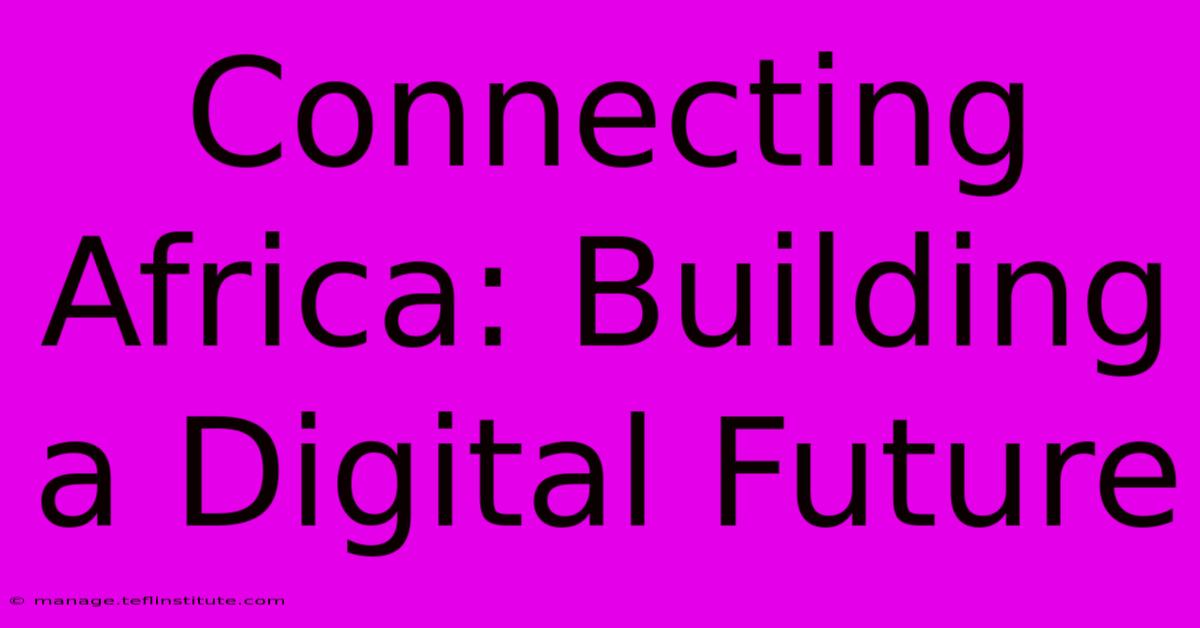Connecting Africa: Building A Digital Future

Table of Contents
Connecting Africa: Building a Digital Future
Africa is at a crossroads. With a burgeoning population, vast untapped potential, and a growing middle class, the continent is poised for economic growth and societal transformation. However, the path forward requires a crucial ingredient: connectivity.
Bridging the digital divide is no longer just about accessing the internet. It's about harnessing the power of technology to unlock a future of opportunity, innovation, and shared prosperity for all Africans.
The Digital Divide: A Hurdle to Progress
Africa faces a stark digital divide. While internet penetration rates are increasing, they remain significantly lower than in other regions. Limited infrastructure, high costs, and lack of digital literacy contribute to this gap. This digital disparity hinders economic growth, exacerbates inequality, and restricts access to education, healthcare, and other essential services.
Building a Connected Future: Opportunities and Challenges
Connecting Africa requires a multifaceted approach that tackles both infrastructure and human capital development:
1. Infrastructure: The Foundation of Connectivity
- Expanding Broadband Access: Investing in fiber optic cables, wireless networks, and satellite technology is vital to extend internet access to remote areas.
- Developing Sustainable Energy Infrastructure: Reliable power supply is crucial for supporting digital infrastructure and ensuring internet connectivity remains uninterrupted.
- Promoting Open Access and Affordable Data: Government policies must encourage competition and prevent monopolies to drive down data costs and make the internet accessible to all.
2. Human Capital: Empowering Digital Literacy
- Investing in Education and Skills Development: Curriculum reform to incorporate digital literacy and equipping citizens with the skills needed for the digital economy are critical.
- Supporting Entrepreneurship and Innovation: Creating an enabling environment for digital start-ups and businesses to thrive is essential for fostering economic growth and job creation.
- Bridging the Gender Gap: Investing in women's education and empowering female entrepreneurs is essential for realizing the full potential of the digital revolution.
Government and Private Sector Collaboration: A Shared Responsibility
Connecting Africa requires a strong partnership between governments and the private sector. Governments must provide a stable regulatory environment, invest in infrastructure, and promote digital literacy. The private sector can leverage its resources and expertise to deliver innovative solutions, expand connectivity, and create new digital opportunities.
Beyond Connectivity: Harnessing the Power of Technology
Connecting Africa is not just about building infrastructure. It's about using technology to address pressing challenges and create a better future for all:
- Healthcare: Telemedicine can improve access to healthcare in remote areas, reducing travel time and costs.
- Education: Online learning platforms can offer alternative education pathways, particularly for underserved communities.
- Agriculture: Smart agriculture technologies can enhance productivity, improve resource management, and increase food security.
- Financial Inclusion: Digital financial services can provide access to banking and microfinance for millions of unbanked Africans.
A Call to Action: Connecting for a Brighter Future
Connecting Africa is a moral imperative. It's an investment in the future of the continent and its people. By bridging the digital divide and harnessing the power of technology, Africa can unlock its immense potential and create a brighter future for all.
The journey towards a connected Africa will not be easy. It will require sustained effort, collaboration, and a commitment to empowering all Africans to participate in the digital economy. But the rewards – economic growth, social progress, and a more inclusive and equitable future – are well worth the endeavor.

Thank you for visiting our website wich cover about Connecting Africa: Building A Digital Future . We hope the information provided has been useful to you. Feel free to contact us if you have any questions or need further assistance. See you next time and dont miss to bookmark.
Featured Posts
-
Eastern Slovakia New Ammunition Plant Ukraine Ties
Nov 14, 2024
-
Superfood Snack Queen Camillas Health Secret
Nov 14, 2024
-
5 G Key To Africas Sustainable Growth
Nov 14, 2024
-
The Life Of Timothy West In Photos
Nov 14, 2024
Latest Posts
-
Onion Buys Infowars At Auction
Nov 15, 2024
-
Alex Jones Infowars Sold To The Onion
Nov 15, 2024
-
The Onion Buys Infowars 2024 News
Nov 15, 2024
-
The Onions Infowars Takeover
Nov 15, 2024
-
Onion Acquires Alex Jones Infowars
Nov 15, 2024
-
Infowars Auction Onion Wins Big
Nov 15, 2024
